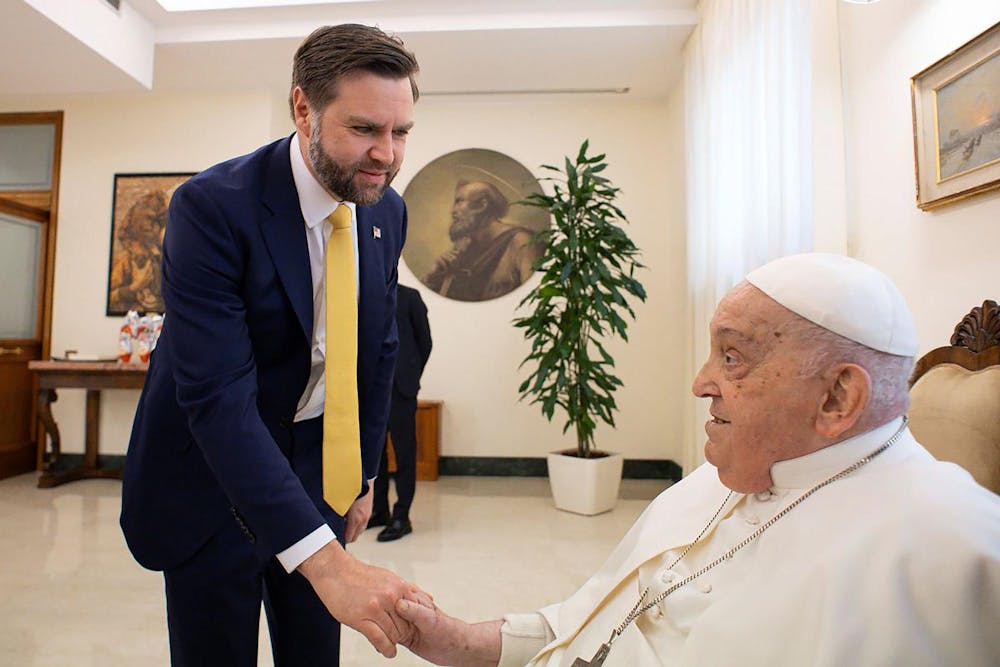Pope Francis, history’s first Latin American pontiff who charmed the world with his humble style and concern for the poor but alienated conservatives with critiques of capitalism and climate change, died April 21 at age 88.
The Vatican said Francis died of a stroke that put him into a coma and led to heart failure.
“At 7:35 this morning, the Bishop of Rome, Francis, returned to the home of the Father. His entire life was dedicated to the service of the Lord and of his Church,” Cardinal Kevin Farrell said from the chapel of the Domus Santa Marta, where Francis lived.
RELATED: Pope Francis dead at 88.
Francis, who suffered from chronic lung disease and had part of one lung removed as a young man, was admitted to Gemelli hospital Feb. 14 for a respiratory crisis that developed into double pneumonia. He spent 38 days there, the longest hospitalization of his 12-year papacy, according to the Associated Press (AP).
The Pope’s Easter Monday passing, a day after the so-called “holiest day of the Catholic year,” has elicited an outpour of reactions worldwide, including from the U.S. Vice President JD Vance, who met with the pontiff on Easter Sunday, hours before his death. Vance released a statement of condolences via X.
"My heart goes out to the millions of Christians all over the world who loved him," he said via the social media platform.
At home, the pontiff’s passing has elicited reactions from many Ball State students and young Catholics who grew up under his leadership.
Seth Schiffli, a second-year property management student and member of Cardinal Catholic’s Outreach Team, Ball State’s student catholic organization, said he was filled with “shock and acceptance” upon hearing the news of the Pope’s early-morning passing.
“We all have to go eventually. He was lucky to make it to the age of 88 and to be with us for so long, but I'm glad that at least he passed away near Easter. He was able to be with us near the end,” Schiffli said, adding, “'I'm glad [Pope Francis] didn't just spend his last few days in bed surrounded by doctors. I'm glad he was with people he loved to be around.”
Even non-catholic, college-aged students fondly reflect on the Pope’s cultural influences and advancements within the Catholic church.
“I believe that the world lost a great man who helped reform the Church, and I am afraid that the next Pope could be a step backwards in terms of policy and Godliness,” Max Redman, a first-year speech pathology student said.
Pope Francis charmed the world with those poignant acts of love, humility and informality, according to AP, which made him known for modernizing religion.
“For Pope Francis, it was always to extend the arms of the church to embrace all people, not to exclude anyone,” said Cardinal Kevin Farrell, whom Francis made camerlengo, the official taking charge after a pontiff’s death, according to AP.
Throughout the world, those who are mourning the pontiff may simultaneously be asking, “What now?”
“I think [Pope Francis] made great strides in making the Church more open and welcoming to all. He is also one of the few Christians who I’ve seen practice what they preach,” Redman said.
It is unclear which direction the Church will take, one that aligns with Francis’ values, or one that is more traditional.
While acknowledging the “incredible tensions and differences” between U.S. Catholic leaders and the Vatican, Peter Dolniak, a third-year architecture major said, “I believe based on global trends, there will most likely be a conservative shift.”
Despite Dolniak’s anticipation of a “conservative shift, “I hate that JD Vance of all people got to be one of the last people to see the Holy Father.”
While some like Dolniak may find the reality upsetting, Schiffli said the Pope’s interaction with Vance is a testament of his character.
“If I had to summarize Pope Francis' papacy in a single story,” Schiffli said, “last night, he had a meeting with Vice President JD Vance, and at the end of the meeting, he gave vice president JD Vance three chocolate eggs to bring home to his kids.”
Schiffli said the small, potentially overlooked action was a perfect “ending note” to Francis’ life because “He didn't care what your gender was. He didn't care what your religion was.”
“That's what [Pope Francis] stood for: kindness and compassion to other people, no matter what they're going through,” Schiffli said.
Contact Katherine Hill via email at katherine.hill@bsu.edu.





